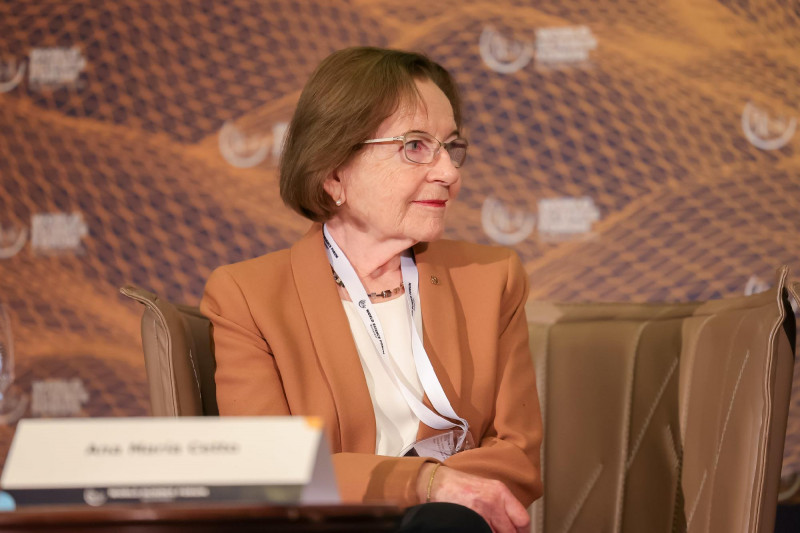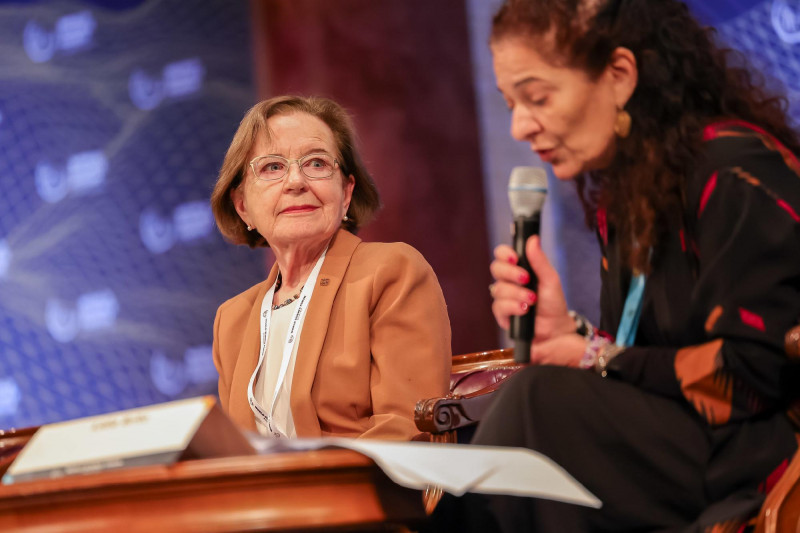“Science can be produced everywhere” – interview with Prof. Ana Maria Cetto
The World Science Forum (WSF) had the opportunity to speak with Professor Ana Maria Cetto after the two sessions she was involved in as a speaker at this year’s event. A wide range of topics came up in our conversation, including the lack of science in people’s lives, how Open Science should be rethought, the commercialisation of science and free access, and bringing science closer to people.
Professor Cetto has published 25 books and 290 articles and was the winner of last year’s UNESCO Kalinga Prize for the Popularization of Science. She does research on the foundations of quantum mechanics at the Institute of Physics, National Autonomous University of Mexico (UNAM), and teaches in the Faculty of Sciences there. She currently serves as President of the UNESCO Open Science Steering Committee and is the UNESCO Chair on Science Diplomacy and Heritage.

The professor expressed appreciation for being able to participate in the proceedings at this year’s WSF and was glad that some other people from her region made the effort to come as well because she feels they are a minority at such events. “It is important that we speak out, that our voices are heard also, because we bring a different perspective.”
Talking about the sessions she took part in, which centred around building trust in science, she explained how, in her part of the world, very little science is taught in elementary schools and high schools and how it is seen as something which comes from abroad which people do not feel they are involved in. “In my country, and more generally in Latin America and the Caribbean, the issue is not so much about whether the people trust or do not trust in science, but that there is very little contact with science among the population in general.” For her, what science is about is not taught, nor is the process of doing science, which means that young people do not acquire the skills that usually come with a science-based education, such as rational thinking and critical thinking.
We spoke about Open Science and her role in the process of bringing it to reality. Professor Cetto was heavily involved in organising the World Conference on Science in 1999, which led to the creation of the World Science Forum series. She feels this 1999 event was a big step forward for Open Science, as this meeting aimed at promoting “an opening up of science”, but that “this has been a very gradual and slow process, slower than maybe we would have expected or liked it to be.”
The professor believes the 2021 UNESCO Recommendation on Open Science was a welcome step forward, hoping it will lead to changes in the science system. “I think it is important because there has been a trend in recent decades of commercialising science, of making it simply look at non-scientific criteria like productivity; you see a lot of emphasis on the number of publications and very much personal individual performance,” she said. “For me what counts is what we as scientists are giving to society.” With her broad perspective as a UNESCO committee chair, she again touched on what she sees as a regional difference. “In my region in particular, we have always been open to giving free access, free non-commercial open access to our scientific production, and to scientific data of course, also. So that is no issue for us.”

In terms of bringing science closer to people, she believes more two-way dialogue is needed. “It's not about bringing science to the people; it's about communicating on science with the people.” She says that we must consider that each individual has their own knowledge background or “package”, and although many may not have received a proper education, we cannot ignore the knowledge they have, especially communities which have no connections to academia and science, but which have already developed a different way of interacting with the natural world, particularly in the context of the environment and sustainable development issues.
“This should be reflected in the Open Science projects, that is, through education and specific activities that bring these various “knowledge holders” and creators together with a respectful and creative dialogue.” She argues examples of non-academic and non-scientific communities coming together with scientific ones already exist, and this kind of multidisciplinary approach to addressing specific issues have led to solutions that would not have been created if the groups had acted in isolation.
She spoke about the need to disseminate the science produced in countries which are not in the “mainstream” more by telling us about her time creating and building Latindex, a free bibliographical information system for all journals produced in the Ibero-American region. This initiative has given visibility to journals and has helped editors produce journals of better quality, although the professor feels that the region has not taken up the task of holding its institutions to account in terms of assessing the performance of their scientists properly.
This also means that commercial indexing services from abroad can still claim greater relevance there. “We’re not saying we’re going to compete or to replace these commercial systems, but there is an alternative, and it is a non-commercial, truly open access nonprofit system that helps the whole region; [this can help] make the rest of the world aware that science can be produced everywhere.”